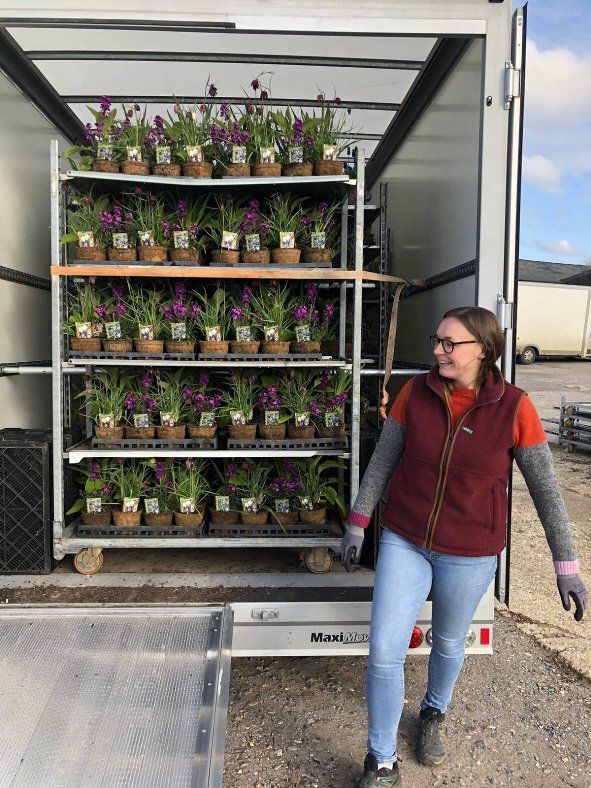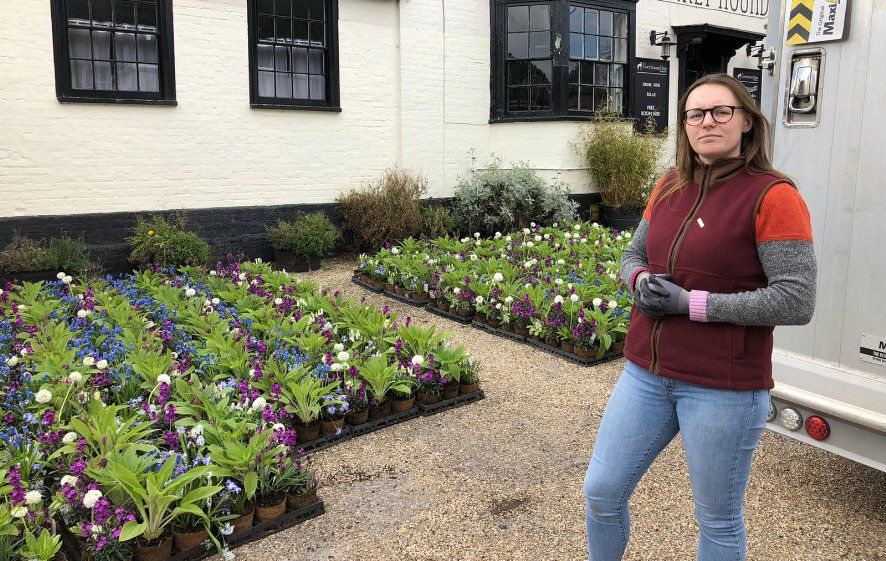Setting up your own Plants for People Project?
Our Plants for People project distributed plants with a retail value of £478,040 so that our plants could find homes during the Coronavirus lockdown.
How and why we developed The Plants for People Project and how it could help your business?
We are a wholesale grower with very perishable crops that were all ready to roll at the very beginning of the lockdown period. We had no internet sales access, very low staff levels (several staff furloughed to save costs because at this time of year we are still close to our overdraft limit and our market/income has been slashed), crops desperate to move off site and a need to get rid of the stock with as little expenditure as possible. This will not be a solution for everyone but it could be a more positive way forward for some, in comparison to dumping crops or selling parts of crops at knock down prices, it has helped us to reduce our losses and given us much more besides.
It took us only 2 or 3 days to set up (you could get started in a day) and relies on getting hold of local volunteer coordinators to distribute household sized packs of plants (for us that was 6 x one litre pots, mostly perennials) to each and every property in their patch. You give them a note (this is ours) to go with each pack, which they leave at the gate/door. Coordinators may take on entire villages or estates with a team of helpers, all working under strict distancing rules, or may just take on their own street. (We suggested a minimum of 40 households for a delivery but we do bend this a bit). Mix of plants is complete pot luck (no pun intended). Once the ball is rolling we found that the coordinators just come flocking, we have been overwhelmed by the interest.
It takes a certain amount of courage to just go for it but for us it has worked.
The main aims for us;
• Clear site completely of crops without a market so that we could clear the production areas ready to produce the next crop for when lockdown relaxes.
• Keep labour inputs to a minimum. – low staff levels mean there is little time to spare, crops are not tidied or tarted up at despatch, just mixed in 6’s into our growing trays, which get returned to us. Deliveries within 10 miles (mostly less). We just deliver to a drop off point selected by the coordinator and leave them to it. Despatch labour is well under half usual cost and delivery time/costs a fraction of the usual. We have used some volunteer labour on the nursery and for delivering the plants too, which helps keep costs down.
• Keep extra material costs to a minimum. The main additional cost over dumping the crop is that we individually label all the plants. No packing materials.
• Some financial return – Hoping to reduce potential disastrous losses rather than make money. Anything that covered the extra costs involved is a plus. Actually looks like we could return close to half the usual wholesale return for the crops and with reduced despatch, transport and packing costs. Instant cash-flow improvement/results. Might not be enough on its own to save us, but it gives us a good fighting chance.
• Potential PR boost – Not really of much use to us commercially, as we supply the retailers, not the public. The geographic area of maximum PR benefit is so small that it isn’t of much obvious use. However, we have generated an enormous volume of goodwill in the local communities and the feel good factor is a huge emotional boost to us and the staff. If this was taken up more widely across the country it could have a very big positive affect for the industry and highlight our plight.
• Increased awareness of the growers plight - I have been on local radio (listen
here) and BBC Panarama have filmed here for two days (although
we may still end up on the cutting room floor!). Our MP has been a coordinator, distributing batches of plants in his community and apparently mentioned our plight in cabinet meetings. We have also generated a lot of sympathy and understanding of our very difficult position within the local population.
Result for us;
• We have had to call a halt to the project after three weeks. By the time we clear the backlog of requests which will take most of the coming week we will have cleared all the stock we need to. We need to hang on to what is left in order to still have crops to sell if the lockdown restrictions are eased in the coming few weeks. If they are not, we can restart the project to clear what we need to.
• Over the last two weeks we have cleared volumes of stock that are higher than out usual peak season output, with less than half the labour use. The first week was a bit slower as things built up.
• We have cleared entire crops in a couple of days which makes for easy clearing up and restocking. We even cleared a bit of stock that had gone past saleable quality for a retailer but is still appreciated by the consumer as a usable plant in the garden (it is potentially free after all!).
• Financial return has encouraged us to re-pot for later in the summer using the cash generated by the project to pay for the production. Still a potential risk but less so now that we have a way of getting a proportion back if it goes wrong again.
• We now have a list of local community coordinator contacts for any further emergencies.
What you need to do;
Work out a household pack mix (ours would retail at about £30).
Make up a note
to go with the plants.
Adapt your website to inform what is going on and provide a payment platform (we used Paypal because it was easily set up in minutes). Not keen but other payment options are offered (cheque, bank transfer and over the phone card payments).
We set up a specific email address to be able to keep correspondence separate from the usual stuff. We also ended up with a number of pre-formated email signatures to make for quick email replies (you get a lot!). We have ones for, coordinator intro, sorry can’t do individual orders, order confirmation, put you on a waiting list, tray return instructions, payment options, thank you, etc (drop me an e mail at P4p@kirtonfarm.co.uk
and I can send you the text if thats helpful)
Provide a guide for the coordinators to read so they can get all the info they need without having to ask too much. Our is attached and here is a coordinators 'how to'.
Keep it simple. We refused to offer specific variety ordering or individual household deliveries (unless they were huge!).
Get in touch with local coordinators. Easier than you might think. There are lots of people out there desperate to do something to help. We have found that going direct to parish councils etc not to be always very helpful. Often a bit too anxious about just about everything, to be very practical or helpful. Having one or two initial successful drops is often the best advertisement (see the Coordinators thank yous email attached
for their experience). When one village/community hears of the success of another, it spreads like wildfire.
Try to be all inclusive. Don’t necessarily target people who you think are more likely to pay something. A full community drop is so much more rewarding on all levels for all.
That’s about it.
If anyone wants to lift any of this info, or info from our website to pass on to others please feel free. This has been an astonishing experience, I can’t believe we have come so far in such a short time. Hopefully a few others can quickly take this approach up too. Don’t hang about, it will be far less effective once the centres open up again. You can shift a huge amount of stock, we could have done many times more in just the local area.
Drop us an e mail at P4p@kirtonfarm.co.uk for a 'Grower pack' if you would like all this info sent to you,
Take care everyone,
Derek

